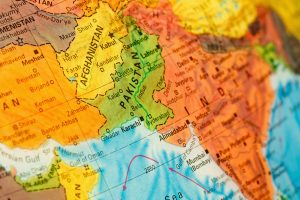On March 11, Pakistan’s head of mission in Kabul, Ubaid ur Rehman Nizamani, traveled to Kandahar for a meeting with Governor Mullah Ali Hanafi (also known as Muhammad Shirin Akhund). The meeting ended amicably, with Hanafi congratulating the Pakistani envoy over the holding of elections. This was the first statement by any Taliban leader on the recent elections in Pakistan, a marker of the tense relations between the two countries.
Hanafi, previously the deputy defense minister of intelligence affairs, was appointed as Kandahar governor in April 2023. His proximity to Taliban leader Mullah Hibatullah Akhundzada (and also close ties with the Taliban’s first leader, Mullah Omar), means that his actions enjoy the blessings of the Taliban top leadership.
Hanafi also heads a joint committee that occasionally holds meetings between Afghanistan and Pakistan. In January 2024 he attended a border coordination meeting and met Pakistani security officials and caretaker Foreign Minister Jalil Abbas Jilani.
After the March 11 meeting in Kandahar, the Pakistani media, quoting Nizamani, stated that the two sides discussed “matters of common interest” and ended in an agreement to “advance Pakistan-Afghanistan relations in all mutually beneficial areas.”
A Taliban spokesperson, meanwhile, said that the meeting was mostly about the clash between the Taliban and the Pakistan Army on the Durand line in Khost province on March 8 and 9. Clashes had occurred after the Pakistan Army carried out “sanitization operations” killing 10 Tehreek-e-Taliban Pakistan (TTP) cadres in the area. The Taliban object to the Pakistan Army’s military base in North Waziristan Province, abutting the contested Durand Line.
Following the clash, the Pakistan Army issued a statement asking the interim Afghan government to ensure “effective border management on their side of the border” and “fulfill its obligations and deny the use of Afghan soil by terrorists for perpetuating acts of terrorism against Pakistan.” The Taliban in its response dismissed the concerns as unfounded.
Pakistan’s attempt to highlight the March 11 meeting in Kandahar as a move forward in bilateral relations comes at a time when the new government in Islamabad is trying to mend it its frayed ties with the Afghan government. There seems to be an emerging consensus in Islamabad that while it must continue to highlight and deal with its security concerns emerging from Afghanistan, it should not let the relations with the Taliban dip any further.
A primary reason driving Islamabad’s renewed policy may be India’s continuing moves to expand its dealings with the Taliban. On March 7, an Indian delegation led by Joint Secretary J. P. Singh in the Ministry of External Affairs held extensive meetings with Taliban Foreign Minister Amir Khan Muttaqi. The meetings explored expansion in bilateral Afghan-India relations, especially economic and transit matters.
The Taliban Ministry of Foreign Affairs spokesperson expressed “gratitude to India for its humanitarian assistance” and sought to “strengthen political and economic relations with India as an important actor in the region.” In response, Singh was quoted saying that “India is interested in expanding political and economic cooperation with Afghanistan and enhancing trade via Chabahar port [in Iran].” New Delhi is seeking to regain its strategic space in Kabul, giving rise to speculations that it may allow Taliban-appointed diplomats to take charge of the Afghan embassy in India soon.
This deepening India-Taliban engagement could be ruffling feathers in Pakistan’s military circles. However, there are no available easy choices.
With the Taliban continuing to assert their undiluted position on critical issues such as the Durand Line, and refusing to rein in the TTP, normalizing ties may prove to be a huge challenge for Islamabad. For their part, the Taliban are frustrated by Afghan refugees continuing to return from Pakistan. While official efforts to forcibly deport them may have been stalled, continued harassment is making their lives challenging in Pakistan. According to the Ministry of Refugees and Repatriation Affairs, over 1,500 refugees returned from Pakistan as of March 2. Managing the growing number of returnees and caring for them has been a real struggle for the resource-starved Taliban regime.
Taliban-controlled Afghanistan has become an Achilles’ heel for Islamabad. Multiple attempts to pressure the Islamic Emirate to cave in to Pakistan’s demands have not succeeded. It is unlikely to be fruitful unless the new government in Islamabad devises ways to meaningfully engage with the Taliban and demonstrates some amount of willingness to accommodate the latter’s concerns.

































